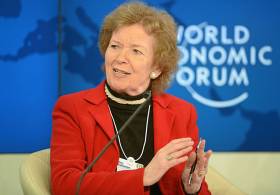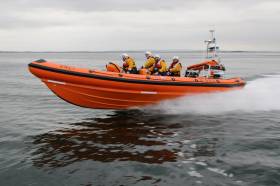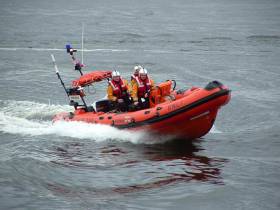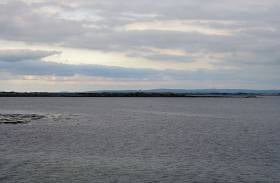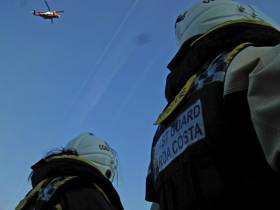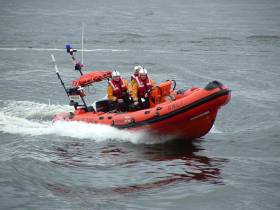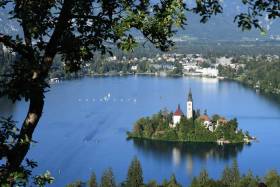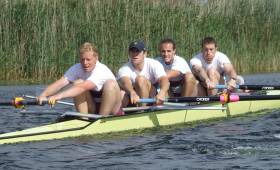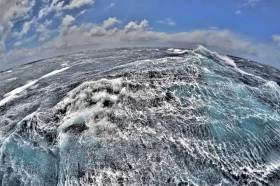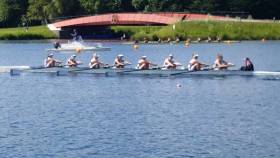Displaying items by tag: Galway
#OurOceanWealth - Former President of Ireland Mary Robinson has been confirmed as keynote speaker for this year’s Our Ocean Wealth Summit, taking place in Galway on Thursday 28 and Friday 29 June.
Now in its fifth year, the Our Ocean Wealth Summit forms a key part of the Government’s integrated marine plan Harnessing Our Ocean Wealth. The summit is a key event for the marine sector and related industries, offering a platform for discussion on the future of Ireland’s marine sector.
This year, the summit will extend across two days with a packed programme of presentations as well as panel discussion, interactive sessions and networking events.
Galway Docks will host the event, expected to attract more than 500 national and international delegates from across the marine sector.
The largest gathering of Ireland’s marine and business communities, the Our Ocean Wealth Summit attracts high-profile speakers from across the globe, not only from the marine sector but from a wide-range of disciplines.
This year’s keynote speaker is Mary Robinson, the seventh President of Ireland and the first woman to hold the office. In 2010 she established The Mary Robinson Foundation – Climate Justice, a centre for thought leadership, education and advocacy on the struggle to secure global justice for people vulnerable to the impacts of climate change.
Other key speakers will include former Nasa astronaut Kathryn Sullivan, who was appointed by US President Barack Obama as Under Secretary of Commerce for Oceans and Atmosphere, and National Oceanic and Atmospheric Association Administrator (NOAA). Sullivan has a long career as a distinguished scientist, astronaut and oceanographer.
Producer of BBC’s award-winning Blue Planet II series Orla Doherty is also one of the highlights of the summit programme. With family roots on the Donegal coast, Doherty has had a strong connection to the sea. She is an expert in underwater filming and has filmed scientists at the frontline of ocean discoveries from Indonesia to the Arctic Circle.
This year’s theme is ‘Investing in Marine Ireland’ and the summit will focus on progress towards the Government’s ambitious targets to double the value of the blue economy by 2030.
The diverse programme planned for this year’s Summit reflects strong collaboration between Bord Iascaigh Mhara, Bord Bia, Enterprise Ireland, IDA Ireland, Fáilte Ireland, Science Foundation Ireland, Marine Institute and the Sustainable Energy Authority Ireland, with individual sessions addressing environmental, economic and societal opportunities and challenges to creating a sustainable ocean economy for Ireland.
The Our Ocean World Summit coincides with Ireland’s national maritime festival, SeaFest 2018 in Galway from Friday 29 June till Sunday 1 July.
Galway Lifeboat Rescues Man After Dinghy Capsizes
#RNLI - Galway RNLI rescued a man who got into difficulty after his dinghy capsized on Galway Bay yesterday afternoon (Sunday 18 February).
The incident happened off Hare Island shortly before 1pm, when a member of the public saw the man was unable to right the 15ft vessel and notified the Irish Coast Guard, who requested the assistance of the RNLI lifeboat.
Galway’s inshore lifeboat launched from Galway Docks at 1.15pm and located the man as he was swimming towards the shore. He was cold and shaken by his ordeal, and the lifeboat crew brought him to the station to administer first aid.
The man recovered a short time later and did not need to be hospitalised.
Galway RNLI subsequently retrieved the dinghy and towed it safely back to Galway Docks, ending the rescue operation at 2.15pm.
Deputy launch authority Barry Heskin advises members of the public to dress adequately for the weather conditions and to always notify a family member or friends of expected time of arrival.
The volunteer lifeboat crew on this callout were Dave Oliver, John O’Sullivan, Ros Forde and Kenneth Kitterick.
Galway Lifeboat Rescues Fisherman With Hand Injury
#RNLI - Independent.ie reports that a fisherman with a hand injury was hospitalised after his rescue from a trawler off Salthill by Galway RNLI yesterday afternoon (Saturday 9 December).
The volunteer lifeboat crew launched within 10 minutes of the alarm being raised and soon met the fishing boat offshore, where they treated the wound before taking him to a waiting ambulance at Galway Docks.
Body Found In Search For Missing Galway Fisherman
#Missing - Emergency responders recovered a body a last night (Thursday 23 November) in the search for a missing fisherman off Galway.
The body was found on the shore in Oranmore Bay, some five nautical miles east of where a fishing boat was discovered adrift yesterday hours into the search.
As previously reported on Afloat.ie, the major air and sea operation was launched after a fisherman was reported missing on Wednesday night.
RTÉ News says the body found last night was brought to University Hospital Galway for a post-mortem examination and identification.
Search Off Galway For Missing Fisherman
#Missing - RTÉ News reports that a major air and sea rescue operation has been launched for a fisherman reported missing off Galway last night (Wednesday 22 November).
A fishing boat was found adrift with no occupant west of Blackrock in Salthill shortly after the search resumed at first light this morning.
RNLI lifeboats from Galway and the Aran Islands are involved in the search with the Shannon-based Irish Coast Guard rescue helicopter in the search, and they have since been joined by local fishing boats.
Galway Lifeboat Rescues Two Stranded By Tide On Hare Island
#RNLI - Two people are recovering after being rescued by Galway RNLI when the tide trapped them on Hare Island, as the Connacht Tribune reports.
The lifeboat launched at 6.41pm yesterday evening (Wednesday 13 September) to reports from passers-by on Renmore beach of people trapped on the tidal island.
With Declan Killilea was at the helm and crewed by Olivia Byrne, Ian Murphy, and John O’Sullivan, the lifeboat was at the scene five minutes later to recover the pair, who were uninjured but shaken by their ordeal.
Both rescued are visitors to the area, prompting Galway RNLI to urge caution to those who may not be familiar with the local tides.
Strandings are not uncommon at Hare Island, with similar incidents in 2010, 2013 and most recently last year.
In other news, Galway RNLI is hosting an open day at its lifeboat station in Galway Docks this Sunday 17 September from 1pm to 4pm. Fire and Rescue Galway, which shares volunteers with the lifeboat service, will also be in attendance.
Irish Crews Win at World Masters Regatta
#Rowing: Irish composite crews had good wins on the first day of the World Masters Regatta in Bled in Slovenia. The Irish B eight (average age 36 or more), which is formed from six clubs won. Two fours in the E class (average age 55 or more) also won – the Galway/Neptune combination by just .26 of a second. The decision was initially given to their German opponents.
World Masters Regatta, Bled, Slovenia, Day One (Selected Results; Irish interest; all heats of 1,000 metres, winners only)
Men
Eight, B (avg 36 or more) – Heat Five: Galway, Commercial, Shandon, Clonmel, Neptune, Cork 3:05.51.
Four, E (avg 55 or more) – Heat One: Galway, Neptune 3:26.26.
Heat Four: Waterford, Neptune, Commercial, Belfast BC 3:28.1
Death of Galway Rowing Stalwart Paul Giblin (34)
#Rowing: Paul Giblin, a hugely successful rower with NUIG/Gráinne Mhaol, has died aged just 34. Giblin had dealt with cancer since 2012 and had undergone a bone marrow transplant in 2015.
His rowing career brought him medals at the World Student Games and the World Under-23 Championships, but he will be best known as a powerful member of the remarkable senior eight and senior fours from NUIG/Gráinne Mhaol. He was part of senior eights wins at the Irish Championships in 2002, 2006, 2009 and 2010, and senior coxless fours wins in 2002, 2003, 2004, 2005, 2006, 2007 and 2009 and 2010. In all, Paul Giblin amassed 17 Irish senior championship wins. He won titles racing in all four seats of the coxless four.
He also competed as a cyclist with Galway Bay Cycling club and took part in Rás Tailteann in 2010.
The Galway man, who was a Lieutenant in the Irish Army will be buried on Wednesday after mass at at St Oliver Plunkett Church in Renmore.
#OurOceanWealth - Maritime Alliance executive director Greg Murphy will provide insights into the success of the US ‘blue tech’ cluster for the Irish marine sector in his keynote address at the Our Ocean Wealth Summit later this month.
Murphy heads a list of speakers announced to coincide with World Oceans Day (Thursday 8 June) for the summit on Friday 30 June at NUI Galway, which will focus on the theme of ‘Rethinking Boundaries and Innovation for a Sustainable Marine Economy’ and where delegates will also receive a progress update on Ireland’s Integrated Marine Plan - Harnessing Our Ocean Wealth.
Terry Garcia, principal at Exploration Ventures LLC and former chief science and exploration officer at National Geographic, will lead discussions on the overwhelming and urgent imperative to innovate arising from our changing oceans.
Bringing Ireland’s blue economy into focus, Dan O'Brien, chief economist for the Institute of International and European Affairs, is addressing a number of topics from the Irish seafood sector, sustainability and economic development in coastal regions to the impact of the Wild Atlantic Way coastal tourism initiative.
Also on the speaker list are representatives from GEOMAR, PwC and Statoil as well as national speakers and panellists including Bord Bia CEO Tara McCarthy and Fáilte Ireland’s head of the Wild Atlantic Way programme, Fiona Monaghan, among others.
They join previously announced innovation expert Tom Kelley, of award-winning global design and development firm IDEO, who will address the summit on encouraging leaders in Ireland’s marine sector to engage in creative thinking.
Moderated by broadcaster and journalist Olivia O’Leary, this year’s Our Ocean Wealth Summit offers a platform for global and national leaders from across the marine industry and related sectors to convene and collaborate on innovating for our marine future.
“Our ocean is a national asset and supports a diverse economy,” says Marine Institute chief executive Dr Peter Heffernan said. “There are many success stories from businesses, from a range of sectors, about how they have responded to the opportunities provided by the ocean.
“To enable our marine potential to be realised, it is essential that we seek new approaches and ways of thinking to harness the boundless opportunities that exist in our marine industry.
“At this year's summit, delegates will be inspired by those leading the way in driving innovation to continue developing a sustainable marine economy for Ireland.”
A number of related marine industry and research events will also be held around the summit on Thursday 29 and Friday 30 June, including the Digital Ocean Conference and the Marine Trade Show.
The Our Ocean Wealth Summit sponsored by PwC and related events are held as part of SeaFest 2017, Ireland’s national maritime festival, from 30 June to 2 July in Galway. For the full summit programme and to register visit www.ouroceanwealth.ie/register
NUIG Women's Eight Impress At Metropolitan Regatta
#Rowing: Irish crews had a very successful second day at the Metropolitan Regatta at Dorney Lake. Monika Dukarska of Killorglin and the Skibbereen double of Denise Walsh and Aoife Casey won in the top single and double sculls races, but other crews also impressed. NUIG’s women’s eight finished third in the A Final in Tier One – the crew, which has a number of novice rowers, had also taken third in the morning time trial. Trinity, UCC, Shandon, Galway, Cork and UCD were amongst the crews which also came away with encouraging results over the weekend.
Metropolitan Regatta, Dorney Lake, Day Two (Selected Results; Irish interest)
Men
Eights – Tier One, Final B: 2 NUIG A, 3 UCD (A). Final C: 1 Trinity 6:07.65. Final D: 2 UCD. Final F: 1 NUIG (B) 6:25.61. Final I: 2 Trinity (D), 3 UCD (C).
Four – Tier Three Final: 1 UCC 6:36.53.
Four, coxed – Championship Final: 3 NUIG (B).
Pair – Tier Two Final: 2 UCC
Sculling, Double
Tier Two Final: 2 Shandon
Women
Eight – Tier One – Final A: 3 NUIG (A). Final B: 2 Commercial. Final C: 3 Galway. Final D: 2 NUIG.
Four, coxed – Tier Three: 3 Galway Rowing Club.
Pair - Tier One Final: 2 Cork (G Collins, L Dilleen)
Sculling, Double – Tier One Final: 1 Skibbereen 7:17.56.
Single – Tier One: 1 Killorglin (M Dukarska); 3 UCD (A Crowley).



























